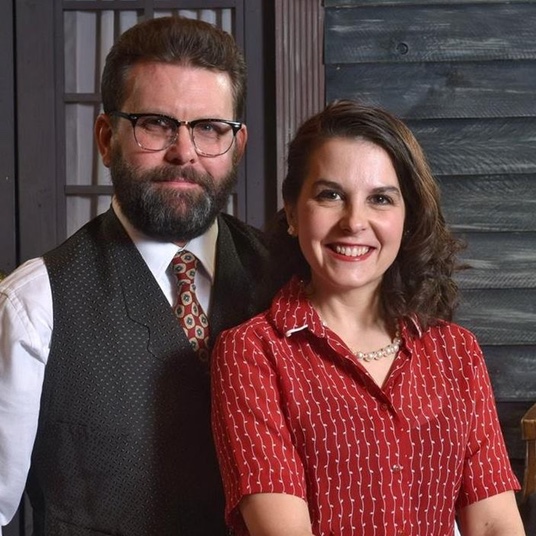
Theater, as does all of the arts, represents the era from which it comes or writes about. For example, Lanford Wilson’s Talley’s Folly places the spotlight on Missouri in 1944, the border state that to this day is noted for its laws and customs regarding prejudice against Jews, Catholics and Blacks (e.g. the Ferguson incident). It also showcases many of the feelings of border Southerners regarding “proper” etiquette, the sanctity of the roles that women are to play in society, and the power of gossip. All this is folded into a charming tale.
Wilson, one of the most prolific playwrights of his generation, was born in Lebanon, Missouri and lived there most of his life. His writing reflects his attitudes toward the traditions of the area.
His themes are often gentle, but what appears to be simple digs deep and reflects “politics, religious discrimination, war, family history [patterns that run deep], money, greed, death and all the mysterious longings of the human heart.”
Because of his stances on social change, he is often compared to Anton Chekov, the late 19th and early 20th century writer who is sometimes referred to as the predictor of the Russian revolution.
His characters frequently speak in a flowing dialogue, identified as “musical” in tone. For example, in Talley’s Folly, Matt, the thirtysomething-year-old statistician, tells the audience at the start of the play that what they are about to see is a “waltz.” He not only demonstrates the dance, but the cadence of his words picks up the 1-2-3 beat of the music.
The 97-minute Talley’s Folly takes place in a single night and exposes the unlikely matching of Matt Friedman and Sally Talley. He is Jewish, she a member of a wealthy family filled with long-held prejudices and social “rights and wrongs.”
Sitting at a dilapidated boathouse next to a river on the Talley farm, Matt, in a speech given directly to the audience, explains not only the setting, but why he is there.
He relates that the year before, while summer vacationing in Lebanon, he and Sally met. He fell in love and sent her a letter each day, and talked to her aunt on the phone at least once a week. Sally sent only a single letter, which contained little hope for a romantic union.
As the play develops we learn of her eccentric uncle who built “follies,” all over town, because he wanted to do so, no matter the attitudes of others — follies like the town bandstand where Matt and Sally met the year before. Eventually they each share a major secret that both have held, which explains why they are who they are. As the lyric, sad, funny, touching play comes to its end, we are left with the idea that Matt believes that “an angel has guided” his path to Sally and she agrees to marry him, move to St. Louis, and they vow to return to the boathouse every year so they don’t forget the place where they fell in love.
Talley’s Folly is part of the author’s Talley Trilogy which includes Tally’s Folly, Talley & Son, which tells of a power struggle between Sally’s father and grandfather, and Fifth Of July, which centers on societal attitudes regarding homosexuality and the disposition of the Talley estate.
The Actors’ Summit production, under the insightful direction of Kevin P. Kern, is charming, humorous and well performed. Seemingly a true romantic who believes in naturally formed unions, rather than matchmakers or computer dating, Kern states “This is a love story that shouldn’t be possible. . . .But in its uncertainty, the love affair is more real, more honest, more true than can be provided by a dot com. He concludes, “It’s certainly more interesting.”
Keith Stevens (Matt Friedman) and Shani Ferry (Sally Talley) have a natural connection that makes their relationship seem totally real. Stevens creates a Matt who is awkward, uncertain, troubled, yet likeable and charming. Ferry’s Sally is an injured woman whose resistance to happiness has a rightful cause. As written and performed, these two wounded birds are meant for each other.
The set, costumes, props, and lighting all add to the success of the production.
CAPSULE JUDGMENT: Talley’s Folly is a fine script that gets an excellent production. The cast (Keith Stevens and Shani Ferry) creates real, accessible characters. The story showcases the kinds of prejudices that often cause problems in people’s lives and suggests that there is hope, even in light of hate and gossip-mongering. This is a go-see evening of theater!
For tickets to Talley’s Folly, which runs through Sun 5/1 , call 330-374-7568 or go to www.actorssummit.org.
[Written by Roy Berko, member, American Theatre Critics Association, Cleveland Critics Circle]Akron, OH 44308